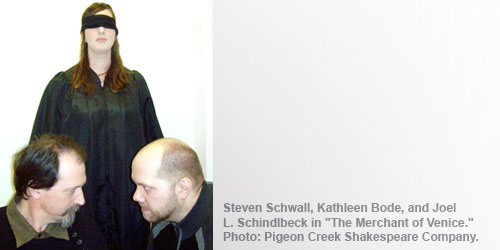By Bridgette M. Redman

Shakespeare's "The Merchant of Venice" is rightly considered a problem play for today's audiences, consisting as it does of strong anti-Semitism and the heart-breaking ending in which Shylock is forced to convert to Christianity. It provides a challenge to modern companies as they determine how to present it – is it a drama? A straight comedy? A tragedy?
Pigeon Creek Shakespeare Company, a troupe committed to original practices such as universal lighting, doubling and an integration of modern musical entertainment, decides to play it straight, just as it might have been in Shakespeare's time. It is a choice that works as they let Shylock be the villain, but one more clearly motivated than the Iagos, Richard IIIs or even the Macbeths of Shakespeare's plays. There is sympathy for this moneylender whose daughter is stolen and who is spat upon by all in the city simply because he has been successful at one of the few professions legally allowed him.
Joel Schindlbeck effectively portrayed this role of a man embittered by his treatment and looking for a way that he might find justice of his own while remaining true to his heritage and faith. It is telling that he is the only one who quotes Scripture or shows any religious devotion other than an outward label. Yet, Schindlbeck clearly shows the harm that years of racist treatment and bullying have wrought on this man. His asides were beautifully played, delivered in a low tone that could be easily heard by everyone in the 50-seat space of Dog Story Theater. His carriage and expressions were impeccable at communicating who Shylock was and revealing his barely controlled inner turmoil.
Schindlbeck's Shylock was villainous and murderous, but he never gave anyone reason to doubt that his actions were strictly and legally in the right. His represented a justice absent of mercy and his fate ended with a justice tempered by only the cruelest of mercies.
All of this is not to say the Pigeon Creek production was presented as a tragedy. On the contrary, it was comedy in a highly playful manner, despite the darkness at its core. The energy of the players and the skill at which they presented a very boisterous and earthy play kept the audiences laughing at their gags, the language and the physical comedy.
Both Kathleen Bode as Portia and Claire Mahave as Nerissa were delightful on stage together, perfectly playing off each other to create a charm and energy that made their scenes engaging and interesting. Despite being subject to a dead man's will, they find ways to take control of their fate and are always in control of the stage whenever they walk upon it. They have a cleverness and wit that outshines everyone, even their over-the-top suitors whose posturing and boasting make the casket scenes humorous and fun.
John Wier's Bassanio was never able to quite stand up to the others on stage, as his choices were limited and narrow and lacking the energy of the other players. While Bode's affection for him is apparent and clearly projected, his love seems limp and unbelievable. It is especially hard to believe that he would risk the life and fortunes of Antonio, the melancholy merchant whom Steven Schwall created with such depth and shading. Schwall's Antonio is complex, a man who is generous to his friends, open and filled with integrity when it comes to the law and spiteful and racist toward the Jews. When his fortunes are good, he is sad and moping. When his fortunes crash, he finds a desperate courage and is willing to sacrifice himself to the demands of order and good trade.
Another standout in this talented Shakespearean troupe was Kat Hermes as Gratiano. She was more than equal to the impish Mahave, and the two made an excellent pair. Their onstage makeout scenes were intense and nearly stole focus as one wondered just how far these two ladies were going to be willing to go.
Brooke Heintz skillfully rotates between characters, giving each one a vastly different flavor, never hesitating to go big as Shylock's servant Lancelot Gobbo or Portia's suitor the Prince of Aragon. Likewise Arielle Leverett traveled the spectrum of servants who were almost unnoticeable to the commanding duke to the lustful Prince of Morocco.
Sarah Stark sets the stage for the play with her soulful solo of "It's a Rich Man's World" to start the play before becoming the eager and innocent Jessica who breaks her father's heart without a second thought for his pain. Her giddiness is well balanced by Tony Myers' serious and sober Lorenzo.
There is a playfulness about Pigeon Creek's production that makes it accessible. All of the performers are skilled at engaging the audience and bringing them into the action of the play, either through the simple act of eye contact, or by actually sitting next to them and talking to them throughout the show. There is a familiarity and ease with the language that all of the players have, and they make the eliciting of smiles from the audience seem effortless throughout the entire show.
REVIEW:
'The Merchant of Venice'
Pigeon Creek Shakespeare Company at Dog Story Theater, 7 Jefferson SE, Grand Rapids. Thursday-Sunday through April 24. $12. http://www.pcshakespeare.com










